InFUSEd: opportunities for training
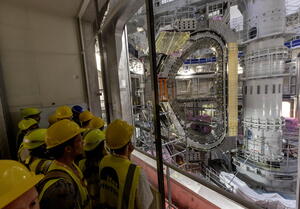
The ITER Organization and the European agency for ITER, Fusion for Energy, will be hosting free tours of the ITER construction site for the general public on Saturday 29 November 2025 from 10:00 a.m. to 6:00 p.m. Sign up will open on the ITER Events page approximately one month before the event.
Join UKAEA and the Fusion Power and Fusion Engineering Centres for Doctoral Training, at Culham Campus on 26 November, from 11:00 to 17:00 for Fusion PhD and MSc Open Day 2025, to see how you can apply your knowledge to work towards clean and sustainable energy for future generations.
Come along to our open day and…
- take a tour behind the scenes at various fusion facilities at Culham.
- network with academics and current students from a range of universities and the Fusion Power and Fusion Engineering CDTs.
- find out more about postgraduate opportunities in fusion and related research.
- attend talks to learn about the different areas of fusion research and
- find out more information on fusion PhDs.
You can register until 14 November 2025. Places are limited due to room capacity. Registration may close earlier than the advertised deadline if capacity is reached.
See all information here.
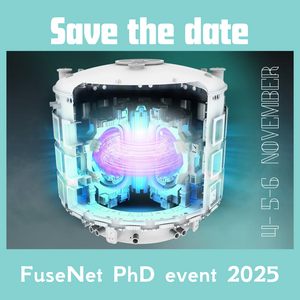
Save the Date! The FuseNet PhD Event 2025 will take place at ITER from 4 to 6 November 2025.
The annual PhD Event is organized by the European Fusion Education Network, FuseNet, as a network event. Meet and greet fellow fusion researchers from Europe and expand your network. The event features high-profile keynote speakers, a top-notch scientific program and the much anticipate PechaKucha contest, where students present their research in 20 slides, 20 seconds per slide.
All information is available on this page. Registration is now open.
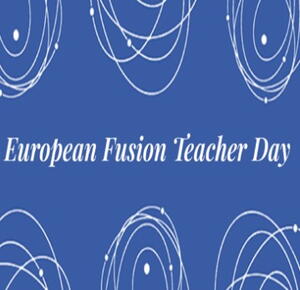
The European Fusion Education Network, FuseNet, is organizing the 6th annual European Fusion Teacher Day on 10 October 2025. The goal is to introduce nuclear fusion to secondary school teachers throughout Europe, to discuss teaching nuclear fusion to secondary school students and to create enthusiasm for the field of fusion at the secondary education level.
The event features a domestic session with lectures by local fusion experts on current fusion research in your area, followed by a global livestream during which new (free) educational materials will be presented and keynote speakers from the international fusion community give an inside look into the largest scientific collaboration in the world. Both the domestic and global parts of the event are fully remote.
Participation is open to every science and physics teacher in Europe. Participation is free of charge. All participants will receive a certificate of attendance after the event.
Find the agenda and more information about registration page on the event webpage.
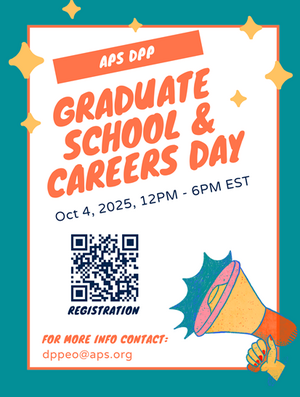
On behalf of the Education & Outreach Committee of the APS DPP (American Physical Society Division of Plasma Physics), we would like to invite you to participate in the APS DPP Graduate School and Careers Day. The event will be fully virtual and will be held on Saturday 4 October, 12PM-6PM EST.
The event program includes:
• Keynote speakers discussing graduate school and employment opportunities
• Graduate school and careers virtual fair
• Panel on fellowship opportunities
• Networking session with graduate students and early career professionals
We are in the process of finalizing the event schedule but it will have a similar format to past events (e.g., see the 2024 agenda).
For student participants, please click on this link or scan the QR code in the attached flier to register for the event.
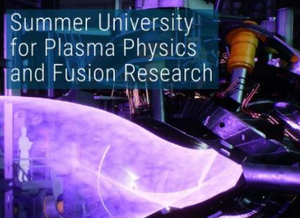
The Max Planck Institute for Plasma Physics (IPP) is organizing its 2025 IPP Summer University for Plasma Physics and Fusion Research from 8 to 12 September in Garching, Germany. The one-week course covers the main aspects of plasma physics with emphasis on nuclear fusion:
- basics of plasma physics and nuclear fusion
- kinetic and magneto-hydrodynamic description of a plasma
- concepts and experimental results of tokamak and stellarator configurations
- plasma heating and diagnostics
- plasma-wall interaction and materials research
- Computational methods in plasma physics
- safety and environmental aspects of fusion
- ITER and the next steps towards a reactor
The lectures are designed for physics and engineering students of European Universities who passed their bachelor (undergraduate) courses and have not yet decided on their PhD topic.
One of the goals of the Summer University is to promote an exchange of views among the coming generation of scientists. Opportunities for discussions with lecturers and students are provided between the sessions, during the reception and during the excursion to ASDEX Upgrade.
Apply by 31 May 2025 on the IPP website.
Apply by 8 May to join the 3rd JT-60SA International Fusion School in Naka, Japan. The two-week school on physics, engineering and tokamak operations will take place from 1 to 12 September 2025. The theme this year is "Innovations in Fusion."
See all information at this website.
The 21st SUMTRAIC summer course will be held from 25 August to 5 September 2025.
During the two-week event, participants will be paired with one or two other participants. Each group will be assigned a fusion-oriented topic linked to actual research conducted at the IPP Prague. This topic may be related to actual data collected during the past 10 years of operation of the COMPASS tokamak or to simulations of past or future experiments. Some experimental topics on the GOLEM tokamak (located at the Czech Technical University) will also be proposed.
Under the supervision of scientists, participants will experience a glimpse of what a fusion scientist does. As in previous years, only one day will be devoted to lectures in order to allow more time to work on the assigned tasks. On the last day of the event, participants will present their work in English in front of a broad audience. Social events such as a tour of Prague, welcome party and a visit of GOLEM are also planned and are considered essential for building social links and the successful realization of the school.
All students from bachelor to PhD levels are welcome to apply until June 8th, including a CV, a recommendation letter, and a cover letter. Among the applicants, 10 students will be selected and applicants can expect an answer around mid-June. A symbolic fee of 100 euros per participant is set to secure participation. Accommodation is covered by the IPP CAS.
See all information on this webpage.
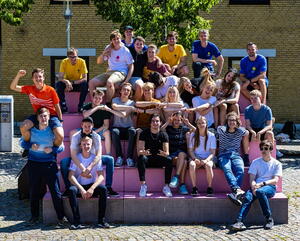
Går du på en gymnasial uddannelse eller har du for nyligt afsluttet gymnasiet og har sabbatår? Og er du interesseret i fysik? Hvis svaret til begge spørgsmål er ”ja”, så er Fusionsenergi Camp noget for dig!
DTU Fysiks næste Fusionsenergi Camp bliver afholdt 3. til 8. august 2025 på DTU i Kgs. Lyngby. Omdrejningspunktet for campen er plasmafysik og fusionsenergi. Som deltager på campen vil du komme til at arbejde som en forsker og lave forsøg på DTU’s moderne, og Skandinaviens eneste, tokamak NORTH. Der er både tilrettelagt et spændende fagligt program og et omfattende socialt program. Campen vil byde på faglig udfordring, sjov og nye venskaber med andre unge, der også interesserer sig for fysik.
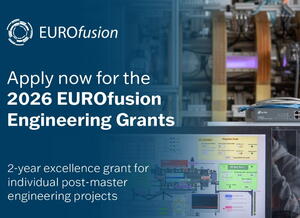
EUROfusion has opened applications for its 2026 Engineering Grants program, supporting the education and development of a new generation of fusion engineers. These two-year grants are aimed at young engineers with a Master's and/or PhD degree working in or entering the EUROfusion program. Around 14 grants are expected to be awarded.
The grants support career development in key competency areas for fusion and are awarded based on the excellence of the candidates. New eligibility rules now allow applicants who completed their MSc degree between 1 June 2019 and 28 July 2025, and candidates may complete their PhD during the grant period.
The application deadline is 28 July 2025. See further details about the program and how to apply here.
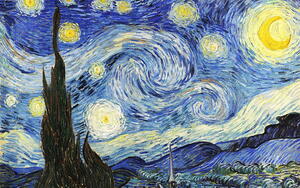
Organized at a leading site for research in plasma physics and controlled nuclear fusion, the Culham Centre for Fusion Energy (CCFE) in Oxfordshire, UK, the Culham Plasma Physics Summer School aims to provide an introduction to the fundamental principles of plasma physics, together with a broad understanding of its fields of application. No preceding knowledge of plasma physics is assumed but familiarity with electromagnetism and applied mathematics at first-degree level will be helpful. Previous schools have attracted students from more than 50 different countries.
Students must be over 18 to attend the summer school and generally will be in their final year of undergraduate or first year of post-graduate study.
The next edition of the Summer School will be held from 14-24 July 2025.
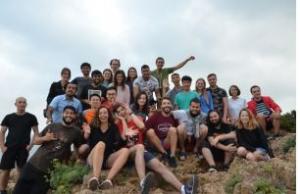
PlasmaSurf is a summer school on plasma physics, intense lasers and nuclear fusion hosted by the Instituto de Plasmas e Fusão Nuclear (IPFN), a research unit of Instituto Superior Técnico, University of Lisbon. It is a great opportunity to get an insight into these topics with a view to a future career, or to complement your curricular training by broadening your knowledge in an exciting and forefront area of physics. Tailored for BSc/MSc engineering and physics students, the course features lectures in self-contained modules, Monday through Saturday, including some practical lectures on remote laboratories, data analysis and computer science.
The 2025 dates are 13 to 19 July.
Apply by 4 June 2025. See all information here.
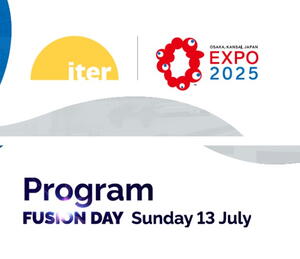
The ITER Project is present at the 2025 Osaka World Fair, where it has a prominent stand in the International Organizations Pavilion presenting the promise of fusion energy and the effort underway globally to master this promising and transformative energy source. Halfway through the six-month exhibition, on 13 July 2025, ITER will host a special FUSION ENERGY DAY in the National Day Hall with presentations, animations and video screenings.
Everyone is invited to this free full-day event. For more information or to register, see this link.
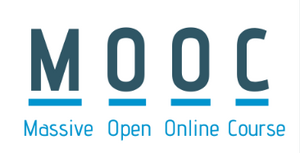
The Instituto de Plasmas e Fusão Nuclear (IPFN) has created a MOOC in plasma diagnostics that can earn you 3 ECTS when blended with the PlasmaSurf summer school. The PlasmaSurf dates, with the online course, run from 4 to 28 July 2025 (with time on campus from 13 to 19 July 2025). See information about application deadlines and fees on this website.
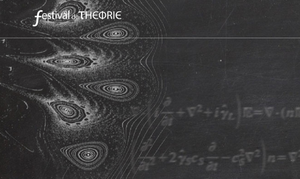
The 13th edition of the "Festival de Théorie" will take place this year from 30 June to 25 July in Aix en Provence, France, on the theme of “Turbulent Boundary Layers.”
The first two weeks will be devoted mainly to seminars (tutorials, topicals and short contributions) with time for discussion and collaboration. The following two weeks will be increasingly devoted to collaborative projects between Festival participants. These are intended both as a means to collaborate with other participants and as a training ground for young researchers (especially PhD students and postdocs).
Travel and accommodation grants are available to offset the cost of travel to and from Aix-en-Provence. Special support is available for young researchers who are willing to attend the Festival in its entirety and participate in the projects
For all information, see the Festival website.

The 6th Summer School of Plasma Diagnostics (PhDiaFusion2025) will be held from 9 to 13 June 2025 in Niepołomice, Poland.
PhDiaFusion is a biennial summer school on plasma diagnostics organized jointly by the Institute of Nuclear Physics Polish Academy of Sciences (IFJ PAN) and the Institute of Magnetic Fusion Research (IRFM) of the Commissariat à l'Energie Atomique (CEA). The School is addressed to bachelor, master, PhD students and their tutors, as well as young researchers. The School will be held in the spirit of "the master and apprentice" approach:
Lectures supported by "hands-on" tutorials will be given by eminent world experts in the field of plasma physics. Oral presentations will be also given by students. The selected papers will be, after a peer-review process, published in a special issue of Journal of Fusion Energy, Springer.
For all information, see this website. Apply by 27 April 2025.
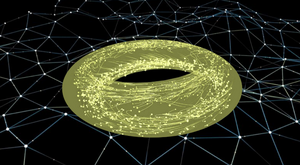
The College of William & Mary in Williamsburg, Virginia (USA) proposes an intensive two-week summer school (2-13 June) for undergraduate students with backgrounds in physics, engineering, computer science, applied mathematics and data science. This will be divided between traditional instruction and active projects. The traditional instruction will provide daily 80-min instruction in morning classes with a focus on computing, applied mathematics, machine learning and fusion energy. Classes will be supplemented with a class focused on fusion energy for the applications the students will tackle during the hands-on component and for students’ summer research.
Applications are open now. Please see this webpage.
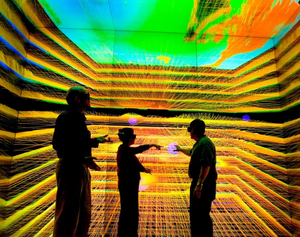
Los Alamos National Laboratory's Computational Physics Division, in cooperation with Advanced Simulation and Computation Program is pleased to sponsor the 2025 Computational Physics Student Summer Workshop. The workshop seeks to bring to the Laboratory a diverse group of exceptional graduate and advanced undergraduate students from within the United States for enriching lectures and to work with the staff scientists for 10 weeks (2 June - 8 August) on exciting and relevant projects that may culminate in articles or conference presentations.
We invite applications from graduate students and advanced undergraduates (minimum of at least one year of college or university). Applications must be submitted online. The application process requires a cover letter, resume, and contact information for a letter of recommendation. Students will also need to select their top three research project choices. Descriptions of this years projects will be posted on the application website.
See all information here.
This two-week-long intensive school organized by the Abdus Salam International Centre for Theoretical Physics (ICTP) and the IAEA from 12 to 23 May aims to develop a wider understanding of fusion energy.
Research into fusion is entering an exciting new era with several large facilities aiming to achieve the crucial milestone of net energy gain. New international facilities using high energy lasers and superconducting magnets are crucial steps on the way to reliable fusion energy but there are still many challenges to overcome. This school will address these challenges. Participants will be introduced to the skills in computational and experimental plasma physics, and conduct cutting-edge research and technology under the guidance of leading international scientists and engineers. Participants will have the opportunities to interact with world-class international fusion experts, making the Fusion Energy School an excellent way to explore your interest in fusion and prepare for a career in this field.
Applications are open now. See all information on this page.
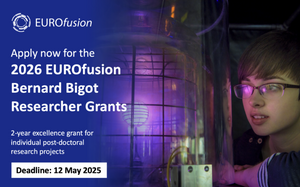
Applications are open for the 2026 EUROfusion Bernard Bigot Researcher Grants funding individual post-doctoral research projects for two years starting in 2026. The grants will contribute to the salaries, research and training activities of up to nine outstanding early-career researchers. With this grant, EUROfusion encourages excellence and career development of researchers who are already in the fusion program and aims to attract high-quality potential candidates from outside fusion research.
Eligibility:
* Researchers and engineers of all nationalities in possession of a doctoral degree (PhD) who have completed the PhD and defended their thesis in the two years preceding the application deadline.
* The candidate must be employed by a EUROfusion Consortium member or one of their Affiliated Entities during the grant period. Interested candidates should jointly prepare their application with an institute(s) affiliated with EUROfusion, who will submit the application and offer to employ the candidate for the proposed duration of the project.
Apply by 12 May 2025. For all details, application documents, and deadlines see this webpage.
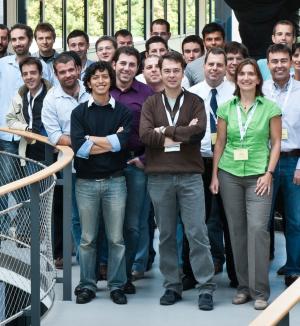
The Karlsruhe International School on Fusion Technologies has been held since 2007 at KIT Campus Nord (former Forschungszentrum Karlsruhe). It started as 'Fusion Summer School' attempting to enlarge the knowledge of young international scientists on the process of nuclear fusion. Leading scientists from KIT as well as international partners will present their scientific topics during the summer school.. Additionally there are some insights into the labs and facilities situated at the KIT.
The 2025 school will be held from 7 to 15 May. Registration is open now on this website.
The Office of Science Graduate Student Research (SCGSR) program creates a pathway for you to advance your PhD thesis research while working at a Department of Energy (DOE) National Laboratory, collaborating with world-class scientists, and using state-of-the-art facilities and cutting-edge scientific instrumentation. While maximizing the impact of your own research, you will also expand your professional network and develop new opportunities for your future.
Learn all about SCGSR at this address. Apply by 7 May 2025. (A second 2025 call will be announced with a deadline in November 2025.)
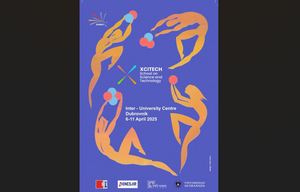
The DONES Xcitech School will take place from 6 to 11 April 2025 in Dubrovnik, Croatia.
The third edition of the School, which is a collaborative effort between the University of Granada (Spain) and the IFMIF-DONES España consortium, is a premier science and technology education platform. Focused on Big Science technologies, the school aims to create a new generation of highly skilled professionals. It serves as a crucial bridge connecting academic research with the demands of the expanding Big Science industry, and in particular of fusion energy.
The program is built around two specialized courses that will explore the science and applications of advanced fusion technologies: Radiation Effects on Fusion Structural Materials and IFMIF-DONES in Depth.
The registration deadline is 1 April 2025. See all information here.
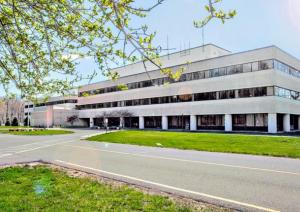
In the Operations Internship Program, undergraduate, and graduate students join staff at the Princeton Plasma Physics Laboratory for 10 weeks in the summer providing a valuable, practical experience performing tasks critical to the successful operations of a National Laboratory.
As projects become available, applicants must apply online, providing a transcript and two reference letters(Link is external) (Link opens in new window), by March 15, 2025, for the summer of 2025.
To be eligible, applicants must:
- Must be enrolled in high school, in a four-year college or university, recent graduate (up to one year)
- Be eligible to work in the United States
For more information, see this website.
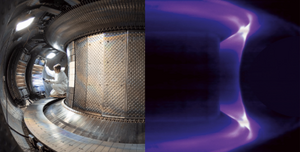
Apply before 15 February 2025 for the Erasmus Mundus European Master of Science program in nuclear fusion and engineering physics.
The European Master of Science in Nuclear Fusion and Engineering Physics (FUSION-EP) is a two-year Erasmus Mundus Joint Master Degree (EMJMD) funded by the European Union. Focusing on the physics and technology of nuclear fusion as an energy source, it offers research-oriented education in engineering physics, offered by a consortium of eight European universities. No Erasmus Mundus scholarship will be available for this campaign.
.
See all information on this website.
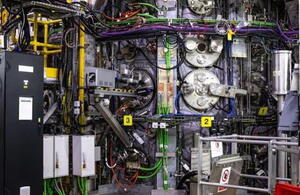
The UK Atomic Energy Authority (UKAEA) is organizing a Fusion Engineering Academy over two weeks in early 2025 at the Culham Campus near Oxford. The training will have these features:
- Specifically for engineers and scientists (a STEM degree is a prerequisite)
- Hands-on activities
- Lectures supported by written assignments and study sessions with a tutor
- All Academy materials will be open access
The Academy is divided into two parts (10-13 February 2025 and 3-6 March 2025), which can be booked separately, although it is recommended that delegates take both. (Any delegates attending Part 2 only will be asked to study the introductory material from Part 1 which will be supplied.) Registration is open now.
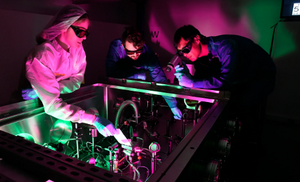
The ZEUS and Plasma Physics (ZaPP) Summer Undergraduate Research Program at the University of Michigan (USA) is designed for undergraduate students seeking a research experience focused on plasma physics outside their home institution. This year's program will take place from 26 May 2025 to 4 August 2025.
Eligible Applicants Must:
- Be full-time college students at a U.S. university or college
- Have completed at least two semesters
- Have a minimum GPA of 3.0
- Devote 10 consecutive weeks to full-time laboratory research
Application deadline: Monday, February 3, 2025 (letter(s) of reference must also be received by the deadline)
See all information here.
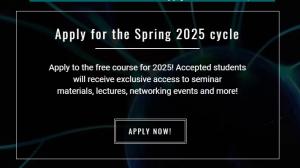
The Computational Research Access NEtwork (CRANE) is organizing a WINTER/SPRING 2025 VIRTUAL SEMINAR on Computational Research Methods for Plasma Physics & Sciences for underrepresented communities. The course is free to undergraduates. Apply before 6 December 2024.
